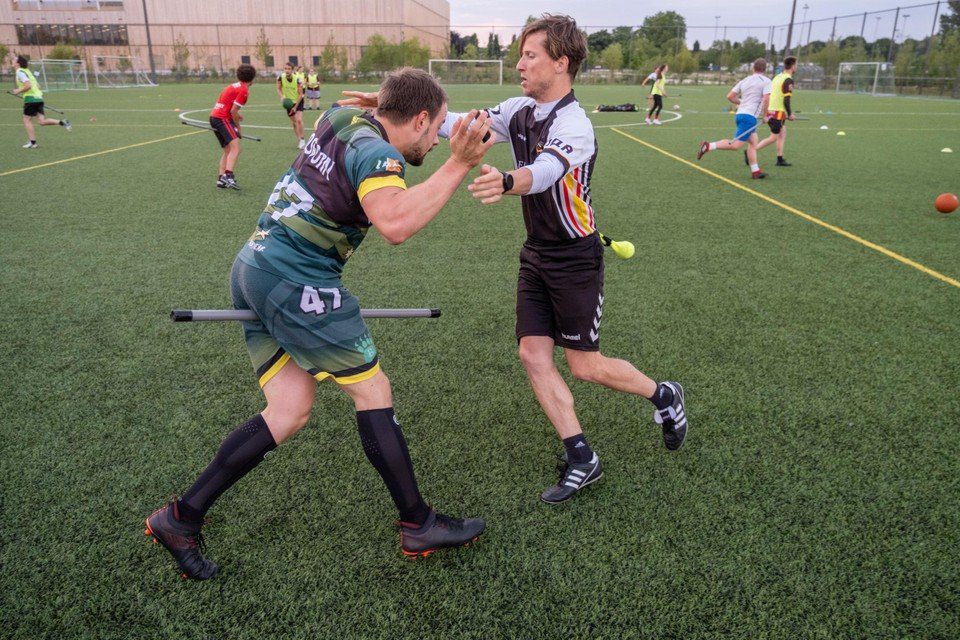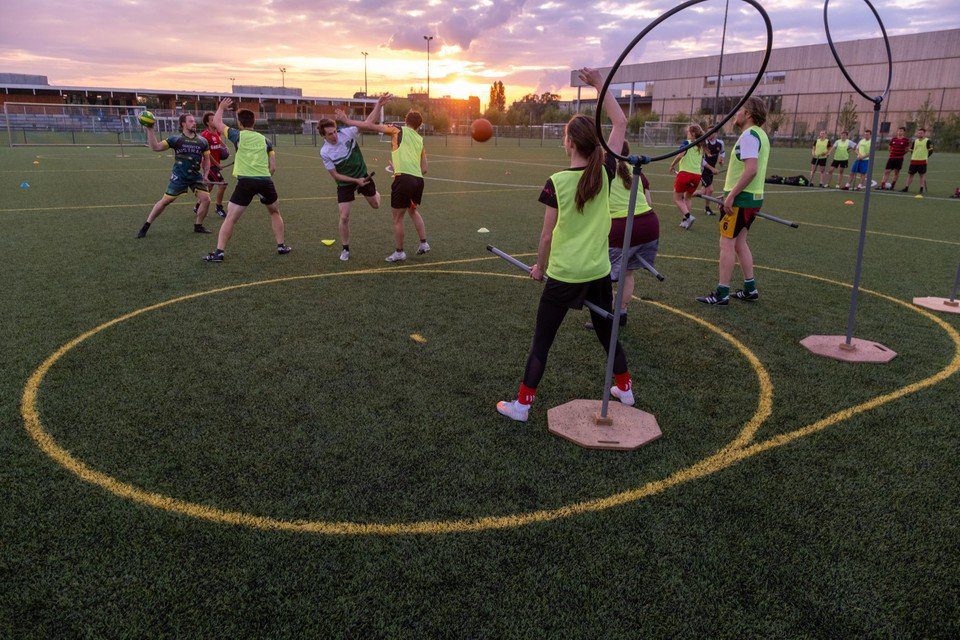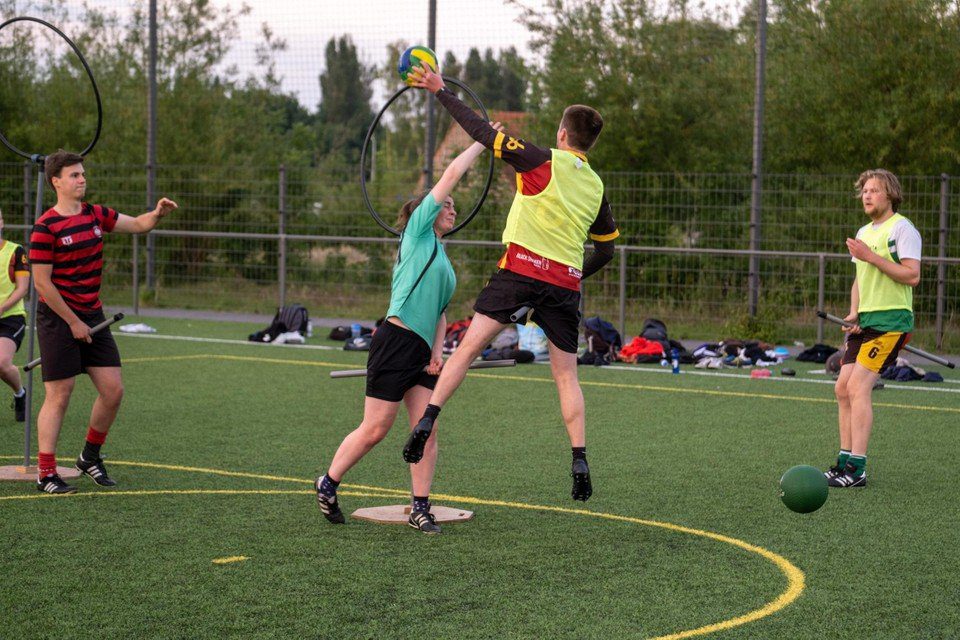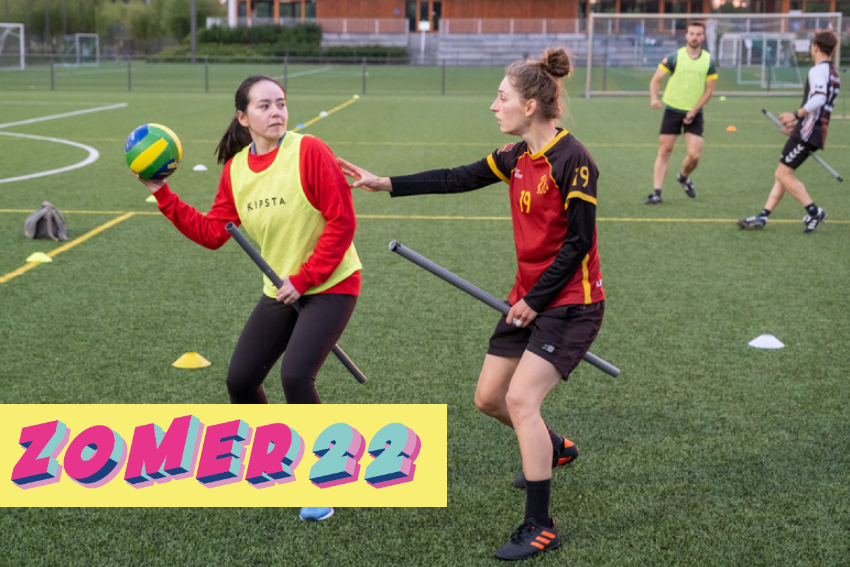Quidditch in a nutshell:
- What? In Quidditch, a sport that originated in the Harry Potter books, as a team you have to try to throw the ball into one of the three rings to score points. You can earn extra points if you claim the golden snitch, a tennis ball suspended from a runner’s back. Once he is caught, the game is over.
- where? Antwerp Quidditch play on artificial turf pitches next to Sportoase in Deurne.
- Whose: You don’t have to read Harry Potter books to understand the game. Everyone, young and old, is welcome to take part in a number of courses and learn about the game. You won’t be able to join experienced players right away, but from my own experience I can assure you that your first try will be totally worth it!
- How much is it? You don’t need any special equipment to participate. A pair of soccer shoes and sportswear is enough.
- equipment: You don’t need to buy brooms or balls, the club provides them for every training session.
- How many times: Depending on when the European Championship or World Cup takes place, the seasons of play may vary. There is usually training every Monday and Thursday in Deurne, and in winter you can play in the Antwerp gym.
7.30 pm at the Ruggeveldlaan Sports Complex in Deurne. A little earlier I met the founder of Antwerp Quidditch Club on the artificial turf pitches, because Quidditch doesn’t seem to be a sport I can play without any prior knowledge. Fortunately, Louis Lermitt (25 years old) knows the sport as one of the best in Belgium and I have complete confidence that I can play after a short start.
Quidditch (quidditch or quadball in English) hasn’t actually been around for long. The sport originated in 1997 with JK Rowling, the author of the world-famous Harry Potter books. Because Quidditch was written in detail, in 2005 American fans/athletes decided to bring the sport from the seven-part fantasy series to the sports field. Less than five years later, this trend continued in Europe and in 2013 Quidditch settled in Antwerp.

Harry Potter during a Quidditch game. – © Warner Bros.
From joke to club
The Antwerp Quidditch Club was initially created by Lewis as a joke. “I was 17 and had seen people playing Quidditch online in the UK and France. I thought it would be fun to try it out with my friends. One Friday after school I gathered some friends to exercise from the Harry Potter books. It wasn’t the intention at the time to start club, but just to have fun together. Because everyone loved her so much, we just kept doing it.”
Because the group of friends had so much fun, they decided to participate in the European Championship 2014 (without high expectations). Lewis laughs: “We had the mentality that we were going to play ‘Syoten’ there, but we held a strong grip on that. We started really taking the sport very seriously and in 2015 we were the first to set up a club in Belgium.”

Antwerp Quidditch club belongs at the top in Belgium, with Louis Lermitt (bottom centre) as coach. – © Joris Heregoods
Since 2014, Quidditch has begun to spread throughout Belgium. In addition to the Antwerp Quidditch club, the Belgian league now has between six and eight teams. The best players from the World Cup came together to form the Belgian national team.
“They started in Brussels around the same time we started, and it’s completely coincidental,” Lewis says. “There was a Canadian here in the exchange and he brought the special balls to play Quidditch here.”
While the Harry Potter books and films attract millions of fans around the world and the franchise continues to drive sales, I wonder: Can Quidditch be taken seriously? In the books, everyone flies like a hero on a broom, but here, due to gravity, players solve it by sticking a long stick between the legs. “I understand that if you pass by and don’t know Quidditch, it sounds ridiculous. But once you take Quidditch and the community around it seriously, you’ll realize that it’s an intense sport. National competitions, the European Championship or the World Cup, the atmosphere is as dangerous as with any sport.”
the games
Whether it’s as intense as it sounds, I’ll test it out right away. As the team prepares for an important match, I will be standing on the sidelines for a while to watch the game and let the professional players do their work. Antwerp Quidditch Club members took first place in the national rankings this year, so I know I’m in the right place in terms of level.
The objective of the game seems very simple: throwing the ball through one of the three rings set up, that gives you ten points. Only with the positions of the players does the implementation become complicated. Each team has seven players. The three “chasers” or fighters try to score points in the rings with the ball. A goalkeeper is also assigned, but may (as in football) move all over the field. The “speculators” or floats have the hardest part of the game. They can throw the ball to other players to temporarily disable them (like a dribbling ball). Once the player is hit, they must immediately drop everything and return to the rings to “click free” themselves.
Then you have another important role for the best runner: the “Seeker” or the Seeker (by the way, the role in which Harry Potter excelled). This player’s goal is to catch the golden snitch. Once you have that ball in your possession, you get triple points and the game is over. The golden snitch (tennis ball) is usually brought onto the court around the 17th minute.

Pushing and pulling is sometimes a problem, especially if you have a golden snitch (player on the right) in your pocket. – © Joris Heregoods
Focus and teamwork
After studying some attack tactics in Focus, it was my turn to test my best skills. I put on a fluorescent jacket, grabbed a broomstick and put myself on the field. Since it was my first time, I’ll take the easiest role: stalker or hunter.
I grabbed the ball to start the match and after the first sprint for the rings I knew right away that everything was going really fast. I try to keep an eye on the opposing team fighter so she doesn’t take my ball, but before I know it, a floater throws another ball into my hip. I let myself go and rushed to our side of the field to free myself again. Also striking: it gets tricky at times. Good push and pull is the daily arrangement to wrestle yourself for the rings.

The fighters guard the goal while the opponents attack. – © Joris Heregoods
After I put myself back in the game, my teammate gave me a ball. Catching the ball wasn’t easy, and it must have looked so clumsy, because I only had one free hand (the broom stays between your legs). I walk behind the rings to prove a point, but I immediately notice that I will not succeed: in front of each ring, there is someone ready to catch the ball. I look back and hope the other fighter on my team can finish our attack.
After five laps, I’m completely exhausted. Physically, but especially mentally. Even though I know the best and the best of what to do in each round, it can still be hard to keep up with the pace of the players. I obviously need a little more solo training before I get the broom between my legs again. Bonus point: The seasoned players at Antwerp Quidditch thought I hadn’t done poorly the first time: that makes the draw less bad.

You need to focus on Quidditch to score. – © Joris Heregoods
Final verdict
Quidditch is a fun sport if you like quick reactions and well-coordinated teamwork. You need some time to train your position in the game to be at full length both physically and mentally. Communication is also important, as you need to constantly let your teammates know where you are and whether you have been fired to fill a place. I have personally experienced that the Antwerp Quidditch club is the best in Belgium, I am impressed with both the professionalism and the cooperation during the match.
The fact that you can score from the front and back makes the aggressive attack even more interesting. And that broom between your legs doesn’t really bother me, but I hope in the future we can get our hands on a flying version of Quidditch, so we can really hover in the air like Harry Potter.

Almost scored! The fighters rushed to defend the ring. – © Joris Heregoods

Tv fanatic. Freelance thinker. Social media enthusiast. Total bacon lover. Communicator.

